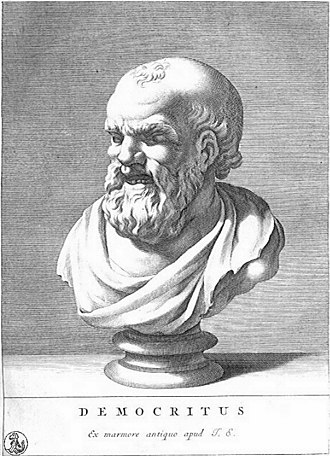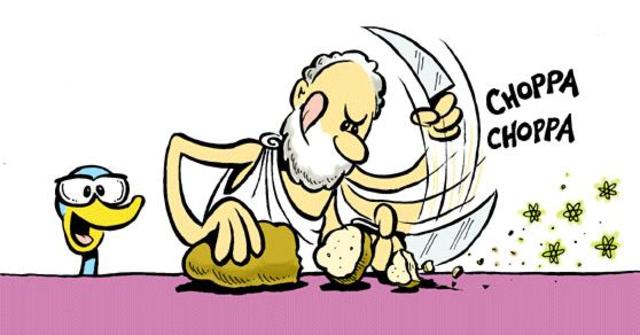|
home | what's new | other sites | contact | about |
||
|
Word Gems exploring self-realization, sacred personhood, and full humanity
Quantum Mechanics
return to "Quantum Mechanics" main-page
c.460 - c.370 BC
Let’s say you have a piece of gold - or anything. If you cut it in half, then cut it again, and keep on doing this, eventually, you’ll reach a very tiny particle of gold which cannot be cut or be made smaller.
chopping things into smaller and smaller bits, until you can't cut or divide anymore When you get to that last bit that can’t be cut down any smaller, now you’ve reached what Democritus called an “atom” – which, in Greek, means “uncuttable” or “indivisible. He and his teacher Leucippus saw the world composed of tiny little specs of uncuttable stuff. Not bad, really, for 440 BC. These atoms, Democritus believed, joined mechanically with other atoms to make things. For example, iron was made of very hard little specks, and they had little hooks and holes, allowing them to link up with other iron atoms. Water atoms, he thought, were soft and slippery, and salt atoms had little spikes on them, which made them taste "sharp". Well, it was a good start. The universe, they said, was a giant machine of atoms and space (“the void”) between them. A pretty good theory for 2450 years ago. the smart-and-popular money didn't like it at all But Plato, later, really hated all this, considered it misinformation, and wanted to burn any parchment referring to Democritus’ ideas. Aristotle, too, totally disagreed and offered his own theory of the four basic elements: wind, fire, earth, and water. Aristotle’s view caught on and was the accepted and “approved” concept for the next two thousand years or more, while Democritus’ idea was thought to be nonsense. It happened this way, probably, because of Aristotle’s popularity as a teacher, and so the halo-effect enshrined error and set progress back for a very long time. Editor’s note: Today we live in a world of Orwellian “Ministry Of Truth” wherein self-appointed infallible Dear Leaders attempt to tell the rest of us what to believe as fact or “misinformation.”
|
||
|
|

